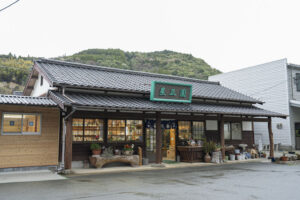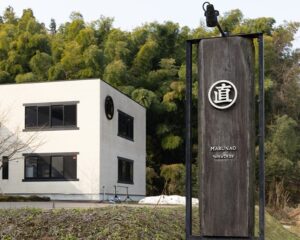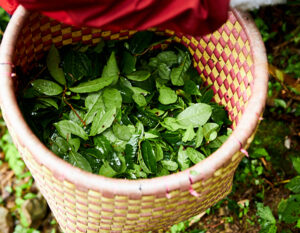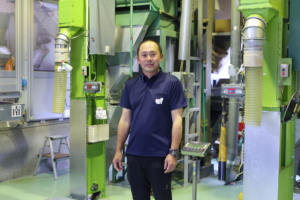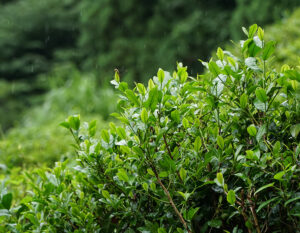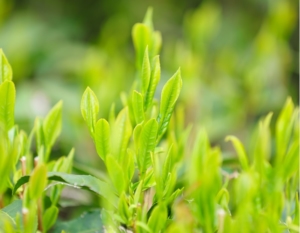Yame Traditional Gyokuro, the Highest Quality Gyokuro
Yame City is an agricultural city with a population of 65,000 located in the southwestern part of Fukuoka Prefecture. The world-recognized “ Yame Traditional Gyokuro ‘ is produced in a mountain village described in the ’Nihon Shoki (Chronicles of Japan)”. Gyokuro is not a variety, but a cultivation method. While sencha is generally harvested several times a year, starting with the first tea, followed by the second and third teas, gyokuro is only the first tea. Most of the harvest is done by hand. The biggest difference between gyokuro and sencha is that the entire tea plantation is covered with a cover (kabuse) two to three weeks before harvest to block out the sun. Catechins, the bitter component of tea, increase through photosynthesis.
The lack of photosynthesis by blocking out the sunlight leads to an increase in atenin, which is a flavor component, and as a result, the gyokuro tea has a strong flavor. In addition, the Yame Traditional Gyokuro tea must be hand-picked and covered with natural materials such as straw. By adhering to these rules, Gyokuro has been awarded “GI” status, won the top prize at the National Tea Fair for 20 consecutive years, and won the Grand Prix at the Japanese Tea Competition in Paris, thus maintaining its position as the world’s best tea. The leading expert on this gyokuro is Mr. Yoshiaki Miyahara of Hoshino Village, who has won first place in Japan three times at the National Tea Fair. The gyokuro he produces is an ultra-premium product that once sold for 10,000 yen for 8 grams. Right in front of his house is a tea plantation the size of a large vegetable garden, lined with freshly harvested tea plants with conspicuous branches.

Tea is grown by heaven and earth
I had the impression that tea fields were lined with many tea trees on sunny slopes. This is a fairly small field,” (Nakata) ”But anyway, the soil is good. If we grow carefully here, we can produce delicious gyokuro.”
Mr. Miyahara says, ‘It is ’heaven, earth, and people’ that grow tea. Heaven is the sunlight, earth is the soil of the field, and people are the key. Although it is a small field, Mr. Miyahara’s field has all of these things.
We put straw on top of the enclosure to shade it from the sun. Depending on the weather, we change the location of the straw and the thickness of the straw, and from four days before harvest, we raise the shading rate to 99%.” (Mr. Miyahara)
Gyokuro is roasted slowly in warm water, and the color is vibrant. Gyokuro is not to be drunk in large gulps. Gyokuro is not meant to be drunk in large gulps, but rather savored slowly. Just a few drops of Mr. Miyahara’s Gyokuro will fill your mouth with a surprisingly rich flavor and sweetness.
It has a rich but gentle taste.” (Nakada)
As its name suggests, Hoshino Village is known for its beautiful starry sky at night, and for the fireflies that swarm around it in early summer, creating a beautiful, fleeting light. Enjoying the best tea in the clear air. I was able to spend a luxurious time that is not possible in the city.






